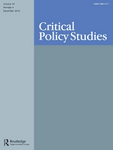Analyzing socio-ecological transformations - a relational approach to gender and climate adaptation
Abstract
Research into the role of gender relations in climate adaptation is still underdeveloped. Social science climate adaptation research thus falls significantly short of the reflective power of various feminist research regarding the role of gender in adaptation to climate change. Many of the available studies on adaptation are gender blind or reproduce an essentialist discourse of female vulnerability and victimization. This article seeks to narrow the gap by broadening the perspectives for a relational analysis of gender, vulnerability and adaptation to climate change. It therefore draws on classical sociologist approaches to gender relations on the intersectionality debate, such as perspectives of Feminist Political Ecology. On the one hand, there is an argument for the identification of structural political economic mechanisms of hierarchization that lead to differing climate adaptation options among women and men. This includes both international and national political and economic state and civil societal mechanisms of regulation, which shape the individual and collective scope of action through their gender-, race- and class-specific effects. On the other hand, we argue for a stronger analytical focus at the subject level in order to capture the identity of political dynamics that contribute to unequal options for climate adaptation among men and women.
